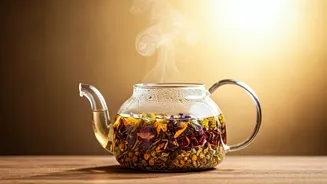Immunity Booster Tea
Herbal teas are potent allies in fortifying the immune system. Certain herbs contain compounds that stimulate the body's defenses against illnesses. For
example, Echinacea, a well-known herb, is celebrated for its ability to shorten the duration and severity of colds. Similarly, elderberry tea is rich in antioxidants, which combat free radicals that can weaken the immune system. Other herbs, such as ginger and turmeric, have anti-inflammatory properties that can soothe the body and promote efficient immune function. Regular consumption of these teas can create a robust defense, helping the body fight off infections more effectively. Remember, herbal teas are a natural and delicious way to support your immune system and stay healthy year-round.
Digestive Health Benefits
Herbal teas also play a crucial role in promoting digestive health. Several herbs can ease digestive discomfort and improve the overall functionality of the digestive system. Peppermint tea, for instance, is known for its ability to relax the muscles of the digestive tract, alleviating symptoms like bloating and gas. Chamomile tea acts as a gentle antispasmodic, reducing cramps and promoting a calm environment for digestion. Ginger tea can stimulate digestion and reduce nausea, making it particularly beneficial after a heavy meal or during travel. Furthermore, certain herbal teas, like dandelion root tea, can help improve liver function, which is essential for efficient digestion. Incorporating herbal teas into your daily routine can provide gentle support for optimal digestion and alleviate common digestive issues.
Heart Health Support
Beyond immunity and digestion, herbal teas contribute to cardiovascular well-being. Some herbal teas are rich in antioxidants, which protect the heart by reducing oxidative stress and inflammation. Hibiscus tea, for example, is associated with lowering blood pressure and cholesterol levels, two critical factors in maintaining heart health. Green tea contains compounds that improve blood vessel function and reduce the risk of heart disease. Regular consumption of herbal teas can lead to reduced cholesterol and lower the risk of heart-related issues. By including specific herbal teas in your diet, you can actively support your heart's health and enhance your overall cardiovascular system's vitality. Always consult your healthcare provider to understand better how herbal teas can complement your heart health regimen.
Diverse Tea Varieties
The world of herbal teas offers a fascinating array of flavors and benefits. Chamomile tea, celebrated for its calming properties, helps reduce anxiety and improve sleep. Peppermint tea, with its refreshing taste, eases digestive problems and headaches. Ginger tea is a versatile remedy, great for reducing nausea and inflammation. Green tea is rich in antioxidants and linked to reduced risks of heart disease and some cancers. Hibiscus tea supports heart health with its potential to lower blood pressure. Echinacea tea is a powerful immune booster, often used during cold and flu seasons. Each herbal tea provides a distinct set of advantages, allowing you to personalize your tea choices based on your health goals and preferences. Exploring different teas can be a delightful journey to enhance your well-being.
Morning Routine Integration
Integrating herbal tea into your morning routine is straightforward and beneficial. Begin by selecting a tea that aligns with your health goals and taste preferences. Steep the tea leaves or bag in hot water, following the recommended brewing time. While the tea steeps, consider adding a mindful moment to your morning. Savor the aroma and enjoy the warmth of the tea. You can combine your tea with your breakfast or take it alone. To make your ritual even more enjoyable, experiment with different additions like lemon, honey, or a touch of cinnamon. Consistency is key when it comes to reaping the rewards of herbal tea. Making herbal tea a daily part of your morning can set a positive and healthy tone for the rest of your day.
























